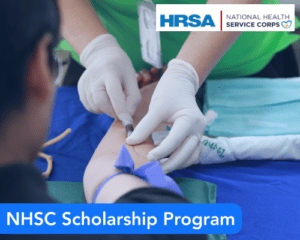Student-centric advice and objective recommendations
Higher education has never been more confusing or expensive. Our goal is to help you navigate the very big decisions related to higher ed with objective information and expert advice. Each piece of content on the site is original, based on extensive research, and reviewed by multiple editors, including a subject matter expert. This ensures that all of our content is up-to-date, useful, accurate, and thorough.
Our reviews and recommendations are based on extensive research, testing, and feedback. We may receive commission from links on our website, but that doesn’t affect our editors’ opinions. Our marketing partners don’t review, approve or endorse our editorial content. It’s accurate to the best of our knowledge when posted. You can find a complete list of our partners here.
What is a BSN to MSN Program in Nursing? Everything You Need to Know
 By
Cait Williams
By
Cait Williams 
Cait Williams is a Content Writer at Scholarships360. Cait recently graduated from Ohio University with a degree in Journalism and Strategic Communications. During her time at OU, was active in the outdoor recreation community.
Full BioLearn about our editorial policies

Bill Jack has over a decade of experience in college admissions and financial aid. Since 2008, he has worked at Colby College, Wesleyan University, University of Maine at Farmington, and Bates College.
Full BioLearn about our editorial policies

Maria Geiger is Director of Content at Scholarships360. She is a former online educational technology instructor and adjunct writing instructor. In addition to education reform, Maria’s interests include viewpoint diversity, blended/flipped learning, digital communication, and integrating media/web tools into the curriculum to better facilitate student engagement. Maria earned both a B.A. and an M.A. in English Literature from Monmouth University, an M. Ed. in Education from Monmouth University, and a Virtual Online Teaching Certificate (VOLT) from the University of Pennsylvania.
Full BioLearn about our editorial policies

A BSN to MSN nursing program is a track of study where students complete their Bachelor of Science in Nursing and then move on to complete their Master’s of Science in Nursing. Between receiving these two degrees, it is common for students to take time off and work as a registered nurse. Once you complete your MSN degree, you’ll be eligible to sit for another exam which allows you to practice as a nurse practitioner. Below we lay out the steps to completing this process and address other questions you may have!
Getting your BSN
Earning a master’s degree usually starts with earning an undergraduate degree. In this case, if your goal is to go from BSN to MSN, you’ll start by pursuing a BSN. A BSN, or Bachelor of Science in Nursing, is a degree offered by most colleges. This means that you should have your pick of colleges when applying. After getting a BSN, most students become registered nurses, commonly known as “RNs.”
While many students do go straight from high school into their undergrad degree, you certainly don’t have to do that. You can receive your BSN at any time and then move on to your MSN. The important thing is simply knowing that you have to complete these degrees in a certain order.
See also: Can you earn a bachelor’s degree at community college?
Becoming an RN
After you receive your BSN, you are eligible to take an exam called the NCLEX. This is the national exam that all individuals must take in order to become registered nurses. Many individuals will complete this exam and then take time off of school to work and gain clinical experience.
Apply to these scholarships due soon
See all Nursing ScholarshipsApplying to an MSN program
Once you’ve completed your BSN, and maybe done a few things in between, your next step is to look at MSN programs and find one that’s right for you! Different programs may have different requirements. Therefore, be sure you know what prerequisites you need, as well as any clinical experience that might be required. If you’re struggling to be admitted to an MSN program immediately after a BSN program, taking some time off might be a great idea for you to help bolster your resume!
Program requirements
While each program might vary with their exact requirements, the things below are some general requirements you’ll find with most MSN programs:
- Prerequisite coursework
- Clinical experience (Typically experience working as an RN)
- Transcripts
- GRE exam scores
- Letters of recommendation
How long does it take to get an MSN?
Getting an MSN can vary in length. Programs may range from 15 months all the way up to two to three years. Programs on the shorter side may be more intense and require students to take on a larger course load at once. So, while a short timeline may seem desirable, just know that it also might be a lot more work all at once.
After an MSN program
After completing an MSN program, students can choose to go on to a DPN (Doctor of Nurse Practitioning), or sit for the nurse practitioner exam. While nearly every state allows MSN holders to practice as nurse practitioners after passing the proper examination, that rule may be changing as more states begin to require nurse practitioners to have doctorate degrees.
What is a nurse practitioner?
A nurse practitioner is a registered nurse who has received an advanced degree, such as their masters or doctorates. Nurse practitioners are generally granted a much larger scope of practice, such as being able to prescribe medication and in some states being able to work independently without the oversight of a doctor. Nurse practitioners can be general care providers or specialize in any other number of areas. They can work in hospitals, clinics, outpatient centers, or a number of clinical settings. Nurse practitioners are able to have a career in the military!
Direct entry MSN programs
While searching for MSN programs, you may come across some that are called “direct entry programs.” A direct entry MSN program is designed for students with non-nursing backgrounds who wish to cross into the nursing field. These programs may still have prerequisite course requirements, but they’ll likely have no clinical requirements as they know students are not coming from healthcare backgrounds.
Benefits of MSN programs
Higher pay
One benefit of completing an MSN program is that you’ll likely be eligible for higher salaries when you apply for jobs. Employers are often willing to pay employees with a higher education more to work in some positions.
A broader education
An obvious benefit of completing an MSN program is that you’ll have a much broader education afterward, and likely have studied in a speciality area. This can be especially beneficial if you are interested in a specific area of nursing that may otherwise be difficult to break into.
Increased job opportunities
After completing your MSN, you’ll have a much broader range of jobs to choose from, especially for jobs that are in an area you specialized in during your MSN! You’ll also be better qualified for higher administration jobs in nursing that are less clinical based and more administration and policy based.













 SAT" printed on his pencil">
SAT" printed on his pencil">
